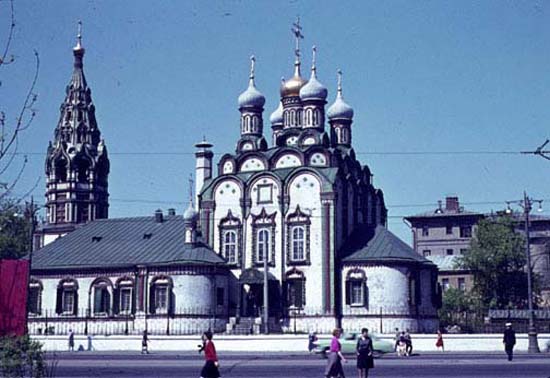
New School Promotes Concept of Volunteerism in Russia
New School Promotes Concept of Volunteerism
By J. Quinn Martin
Special to The Moscow Times
Natalya Nechayeva / For MT
Sergei Matveyev, right, presiding over a meeting last week of the School of Volunteers. The lecture series began in September.
For the first 40 years of Sergei Matveyev's life, there was nothing voluntary about volunteering.
Like every child who grew up in the Soviet Union, Matveyev "voluntarily" scrubbed his school from top to bottom on Saturdays. When he got a little older he spent still more Saturdays "voluntarily" cleaning up the yard near his apartment building -- all in the Bolshevik spirit of compulsory volunteer labor.
Considering all that, it's a surprise that Matveyev recently founded an entire organization devoted to volunteering. Matveyev's School of Volunteers, a radical effort to supplant the dubious legacy of volunteerism in Russia, is a yearlong lecture and seminar series focused on the philosophy and how-to of actual volunteer work.
"For 70 years there was no real charity in Russia," said Matveyev, who also serves as director of the International Foundation for Christian Education, a small charity that runs the school and several humanitarian aid projects around Moscow. What little funding there is for the school comes from the occasional small grant and gifts from private individuals.
A dozen years after the end of Soviet rule, the nation still largely lacks the civic spirit that Westerners, in particular, hoped would blossom in the new Russia. Most nongovernmental organizations are small and relatively ineffective, voter turnout is in decline and individual civic participation, such as volunteering, remains rare.
Matveyev hopes his School of Volunteers can make a change.
"We lived in a country with more fear than community, a country where people did not help each other because they were told there were no problems," he said. "It's sad, but this is still the case."
A class of 18 students began the course in September. The pilot group ranges in age from 17 to 60 and includes working mothers, pensioners, university students and an Orthodox priest. Some are serious volunteers, while others are waiting to complete the course before they begin volunteering regularly.
Crowded into a small hall of the Moscow Merchants Society (which donates the space to the school) in the northeast of the city, the group listens to a lecture by a psychologist on working with difficult children. They share insights with each other about the challenges of reaching out to the needy. Irina Zaikanova, a geologist at the Russian Academy of Sciences, lectures on the history of charity before 1917.
"Before the revolution, there was a great tradition of charity work," she said. "The merchants and the nobility gave generously for the building of hospitals and schools. The church was a great source of support for the poor."
Zaikanova says clergy and laypeople from Orthodox churches across the country are re-emerging as leaders in social work, in many cases on a local scale.
Initiatives like these, and the School of Volunteers, are small but significant indicators of the development of modern civic life in the country.
In fact, these programs are particularly encouraging because they are not initiated and funded by Western groups, like many of Russia's best-known NGOs. George Soros' Open Society Institute has given more than $1 billion in grants to promote civil society and democracy over the past 15 years. In the 2001 fiscal year, the U.S. Agency for International Development spent more than $18 million in the country on civil society promotion alone.
Matveyev and the pupils at his School of Volunteers aren't as sophisticated as these Western groups, but their work is effective and is likely to become more important over time.
In fact, there is some evidence that Western funding for civil society in Russia may be drying up as excitement about the Cold War's end wears off and countries with Muslim majorities hog Western government and media attention in the post-Sept. 11 world.
Soros recently announced a drastic cut in funding for his Russian projects. Overall USAID dollars spent on the country have dropped from a high of $778 million in 1994 to $98 million last year. The government ejected U.S. Peace Corps volunteers last year.
None of this phases the mild-mannered Matveyev. He believes Russians need to create a culture of charity work on their own and that it should be based on national traditions. For inspiration, he looks to the model of charity work before the 1917 revolution and to the tenets of Orthodox Christianity.
Matveyev doesn't know the buzz-words of Western aid groups, like "community building" and "civil society development," but his little charity with a two-person staff is remarkably effective in advancing these causes.
"Little by little, Russian people are becoming more open," said Masha Krivitskaya, a university student enrolled in Matveyev's school, "and losing their fear that doing something good is somehow wrong."
In an Indem poll that surveyed 945 people last summer, two-thirds of respondents who were not involved in civic activity said that they would get involved if they had an invitation to activism and knew where to go to get involved.
"In Russia, you never know what the future holds," Matveyev said. "But the School of Volunteers is our little attempt to make [the country] more humane."
